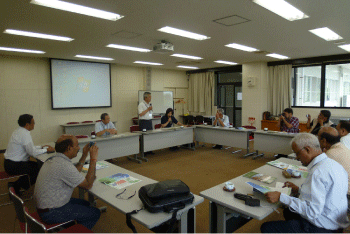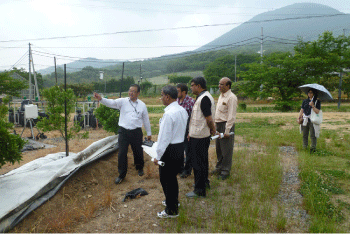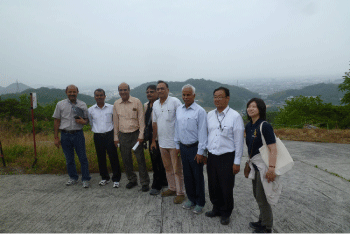Date
May 30th, 2013 (Thu) 8:30AM~11:30AM
Location
NARO Western Region Agricultural Research Center(Kinki, Chugoku and Shikoku Regions) (Ikano, Zentsuhji, Kagawa)
Visitors detail
Six members from the Inspection Training Team for Participatory Forest Resources Management and Decreasing Poverty from Uttar Pradesh, India, along with an executive from JICA and an interpreter (eight in total)
Summary
Uttar Pradesh is located in Northern India, close to the Nepalese border. 9.1% of the state land is forest, but the forest consists mostly of sparse and deteriorated growth; nonetheless, many residents depend on the forest resources for their livelihood. The major tasks are: preventing further diminishment of the forest, promoting sustainable management, and fighting poverty by changing people's way of life from forest-dependent to alternative modes of living.
In order to improve people's lives, one alternative is thought to be the introduction of citrus farming, the products of which trade at a stable price in India. If the project management members master the basics of the "Marudori" (*1) citrus farming system, people back in India will be able to grow citrus fruits or vegetables using the system, even under the severe environmental conditions of heat and low rainfall typical of the area. This was the main objective of the visit.
Mr. Nesumi, the Citrus Production Group Leader, explained the basic structure and logic of the "Marudori" system to the members, and the group visited the actual fruit trees grown under the system. The visitors expressed that the technique was highly useful, and also they wished to implement it in their own country, through the project and related opportunities.
| *1)"Marudori" system | |
| A labor-saving hillside orchard modeling technique. The system consists of automated watering control and fertilizing, using a drip tube under mulch. The system enables a farmer to produce citrus crops with high eating quality, stable yield, and increased content of functional constituents. The system is high in labor-saving benefits and also eco-friendly, with low levels of fertilization and nitrogen runoff. | |

Summarizing the research

Visiting the fruit trees grown under the "Marudori" system

Group Photo




